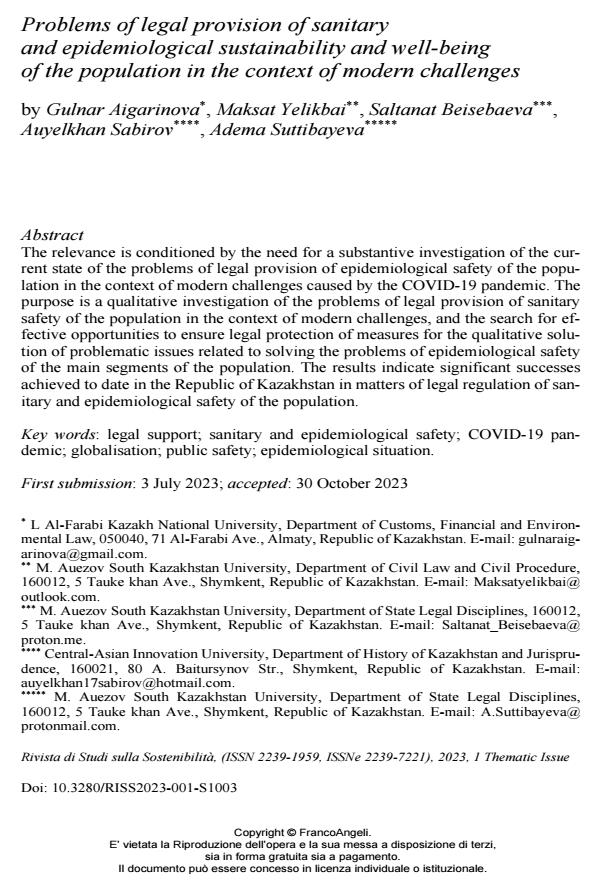Problems of legal provision of sanitary and epidemiological sustainability and well-being of the population in the context of modern challenges
Titolo Rivista RIVISTA DI STUDI SULLA SOSTENIBILITA'
Autori/Curatori Gulnar Aigarinova, Maksat Yelikbai, Saltanat Beisebaeva, Auyelkhan Sabirov, Adema Suttibayeva
Anno di pubblicazione 2023 Fascicolo 2023/1 T.
Lingua Inglese Numero pagine 17 P. 29-45 Dimensione file 124 KB
DOI 10.3280/RISS2023-001-S1003
Il DOI è il codice a barre della proprietà intellettuale: per saperne di più
clicca qui
Qui sotto puoi vedere in anteprima la prima pagina di questo articolo.
Se questo articolo ti interessa, lo puoi acquistare (e scaricare in formato pdf) seguendo le facili indicazioni per acquistare il download credit. Acquista Download Credits per scaricare questo Articolo in formato PDF

FrancoAngeli è membro della Publishers International Linking Association, Inc (PILA), associazione indipendente e non profit per facilitare (attraverso i servizi tecnologici implementati da CrossRef.org) l’accesso degli studiosi ai contenuti digitali nelle pubblicazioni professionali e scientifiche.
The relevance is conditioned by the need for a substantive investigation of the current state of the problems of legal provision of epidemiological safety of the population in the context of modern challenges caused by the COVID-19 pandemic. The purpose is a qualitative investigation of the problems of legal provision of sanitary safety of the population in the context of modern challenges, and the search for effective opportunities to ensure legal protection of measures for the qualitative solution of problematic issues related to solving the problems of epidemiological safety of the main segments of the population. The results indicate significant successes achieved to date in the Republic of Kazakhstan in matters of legal regulation of sanitary and epidemiological safety of the population.
Parole chiave:legal support; sanitary and epidemiological safety; COVID-19 pandemic; globalisation; public safety; epidemiological situation.
Gulnar Aigarinova, Maksat Yelikbai, Saltanat Beisebaeva, Auyelkhan Sabirov, Adema Suttibayeva, Problems of legal provision of sanitary and epidemiological sustainability and well-being of the population in the context of modern challenges in "RIVISTA DI STUDI SULLA SOSTENIBILITA'" 1 T./2023, pp 29-45, DOI: 10.3280/RISS2023-001-S1003